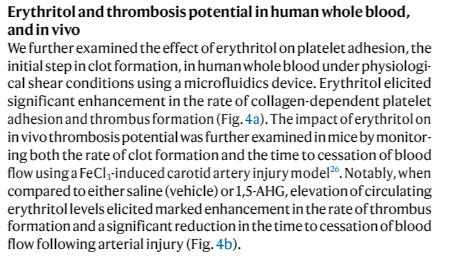So, I read that study.
And they walked away with the same question.
Further research is needed to understand the meaning of these findings, including the interplay between variation in endogenous erythritol synthesis and exogenous exposure to erythritol-containing foods.
So, I don’t understand how you can point to that study as saying that the Cleveland Clinic study as flawed, when the authors of the study on glucose-erythritol synthesis make the exact same caveat in their article.
In fact, the Cleveland Clinic study includes dosing a small cohort with an exogenous exposure to erythtritol and finds that the sugar substitute has a long life in the blood stream before being broken down (in healthy individuals). I also disagree that they “don’t find causation” as that is also a nearly impossible ask in nutritional studies. They did some work in vitro showing increased clotting with high erythritol levels, which is the start of the research to find a causative link.
Regardless of how erythritol is consumed or generated in the body, it doesn’t change the fact that they found in vitro evidence of clotting factors increasing with higher erythritol concentrations. That needs to be further researched immediately. It even pushes the hypothesis that this is an additive effect problem. The people who are eating more sugar, are creating more erythritol in their blood stream, and if they are also consuming sugar substitutes, they are doubling up on the concentrations of erythritol in their bloodstream.
That “Big Think” article isn’t pointing out anything about the study that the authors didn’t already address, and I would say that “controlling for diet” is nigh impossible for studies at the scale of participants they had. Getting people to eat a prescribed diet is tough, especially tough in 3000+ individuals. Also, as has been pointed out, the study was done on data already collected, and they discovered this link while looking through the data.
So, to me, calling it flawed isn’t helpful. All research is flawed to a degree.
That article also makes some mental jumps.
Even if erythritol does truly increase the risk of heart attacks and strokes, it still is replacing sugar, which almost certainly has more pernicious health effects.
Sure, but that isn’t the argument the study is trying to make, especially when there are a plethora of other sugar substitutes.
